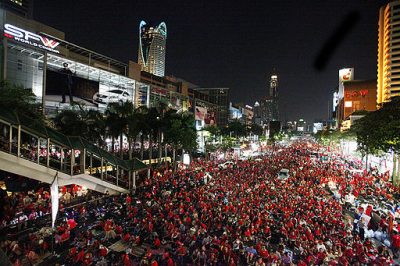Hundreds of red-shirt protesters are in prison awaiting trial on charges that range from illegal assembly to terrorism.
Nevertheless, some expressions of political discontent cannot be avoided. In late July, the government faced a by-election in Bangkok, brought about by the death of one of its MPs. This was an unwelcome test of the electoral waters for Prime Minister Abhisit who has embarked on a high-profile public-relations campaign for national reconciliation. The opposition Pheua Thai party nominated one of the imprisoned red-shirt leaders as its candidate. Offering voters the choice of an opposition figure that the government had labelled a terrorist ensured the poll would be seen as a referendum on Abhisit’s handling of the political confrontation in April and May.
The government’s candidate won the election with about 54 per cent of the vote. Yet the opposition candidate scored about 46 per cent – a defeat, but certainly not a disgrace.
Taking a longer-term view of Thai politics, the government’s modest by-election result was unsurprising. And given Thailand’s political history, the Democrat Party’s trepidation about future elections is understandable. The last time Prime Minister Abhisit’s Democrat Party won the most seats in a general election was in 1992.
Abhisit managed to become prime minister in late 2008 only after the courts dissolved the governing party aligned with former Prime Minister Thaksin Shinawatra. A central demand of the red-shirt protesters was that Abhisit call a general election to test his government’s legitimacy. Talk of an early election is now off the table. According to the constitution, an election is due by the end of 2011 although some analysts suggest that such a poll could be delayed.
In the meantime, Abhisit and his government have some major challenges to address. High on his agenda is protecting Thailand’s monarchy. Since the 2006 coup, the monarchy has found itself increasingly embroiled in Thailand’s colour-coded political divisions. Many people increasingly see the 2006 coup as the handiwork of figures close to King Bhumibol Adulyadej.
Inevitably, royal entanglement in politics has generated comment, and some dismay, locally and internationally. Abhisit has done whatever he can to keep a lid on the criticism.
Many observers agree that such heightened sensitivity is part of a drawn-out preamble to the even more anxious situation when the king dies. It is hardly surprising that these succession anxieties and tensions have emerged towards the end of the king’s 64-year reign. Some commentators suggest that Abhisit’s primary role is to provide a relatively stable and royalist government while the palace succession is resolved. The danger for Abhisit is that he may find himself redundant once royal power plays are concluded. Or the death of the king may lead the palace to take a more conciliatory attitude towards Thaksin, perhaps even paving the way for his return to Thailand and political rehabilitation.
Abhisit’s royal concerns are compounded by reconfigurations within the Thai security forces. The massacre of pro-democracy protesters in 1992 had seriously damaged the army’s status, whose political role was no longer socially acceptable.
This all changed in September 2006 when the unexpected anti-Thaksin coup removed the Democrat Party’s most formidable political opponent. Since then, the army has continued to play a crucial role in bringing Abhisit to power and keeping him there. It’s no coincidence that the military budget has almost doubled since the 2006 coup and is rising faster than in other countries within the region, despite vigorous opposition protests. What makes this situation even more dangerous is that royalist forces now seem to have the inside track when it comes to military promotions. However, most hazardous for Abhisit is the risk that the promotion of royally favoured figures may open tensions within the army.
Abhisit will also be losing sleep over the continuing activism of the yellow-shirts and their newly established political wing, the New Politics Party. Abhisit has always been cautious about aligning himself too closely with the yellow-shirts. An electoral clash with the yellow-shirts could be disastrous for Abhisit. It is unlikely that the New Politics Party would attract mass electoral support, but it may steal enough votes from the Democrats to deliver a swag of new parliamentary seats to the opposition. In Thailand’s first-past-the-post electoral system, Abhisit cannot afford to have his support undercut by yellow-shirt forces.
Through all of these challenges one of Abhisit’s most important political assets is the perception that he is one of the ‘good men’ in Thai politics. Young, well-educated and untainted by business dealings, Abhisit has sufficient credibility and charisma to represent the ideal of a loyal official. There is a common mantra in Thai politics that good men alone are required to manage national affairs.
But the preoccupation with good men is naive at best and deeply cynical at worst. Thailand’s recent political history demonstrates that it has to learn to deal with the full spectrum of political behaviour. The message that goodness is essential for national unity and prosperity will be a hard message to sell if an increasingly assertive army flexes its muscles against opposition groups. The message may evaporate completely if Thaksin Shinawatra returns to Thailand and resurrects his political career. Thaksin is more electorally popular than any good man ever was.
Thai politics would be simple if it only involved good men. Abhisit’s key challenge is to help Thailand develop strong democratic institutions that can cope with the machinations of the good, the bad and the ugly.
Andrew Walker and Nicholas Farrelly are Southeast Asia specialists in the Australian National University’s College of Asia and the Pacific.
A longer version of this article is available here at Inside Story.

